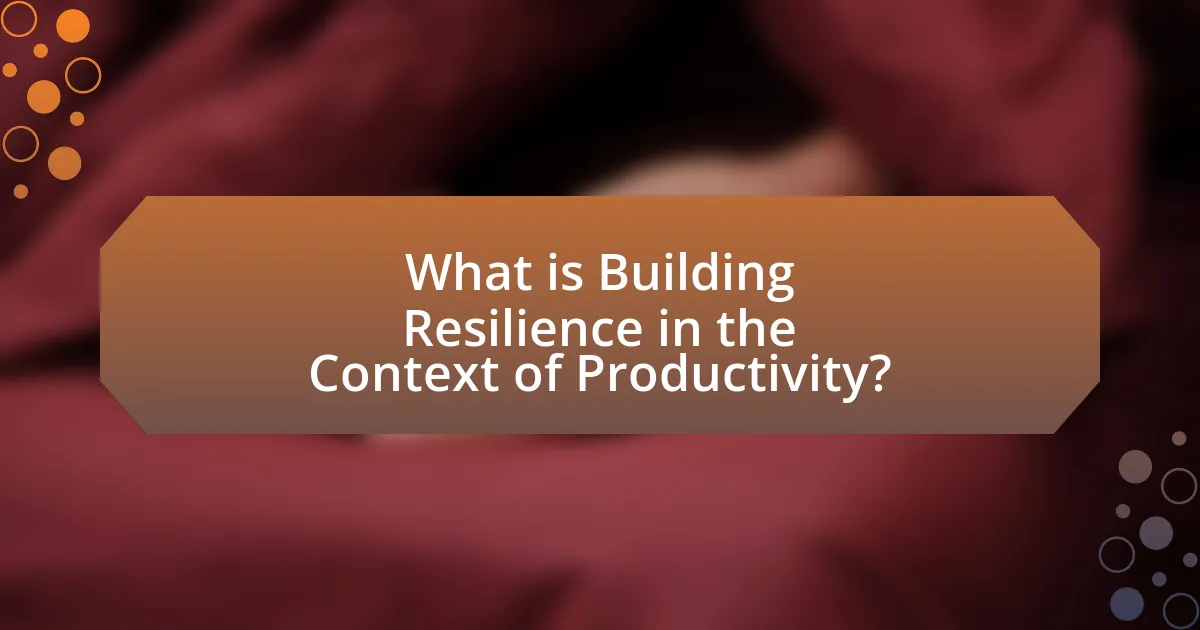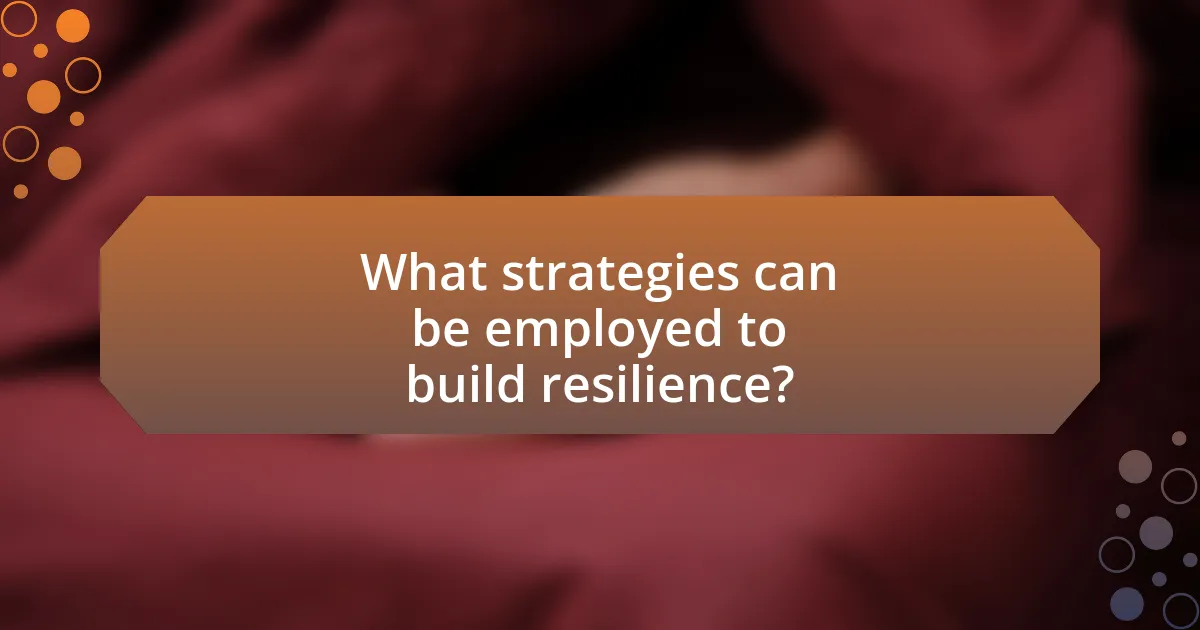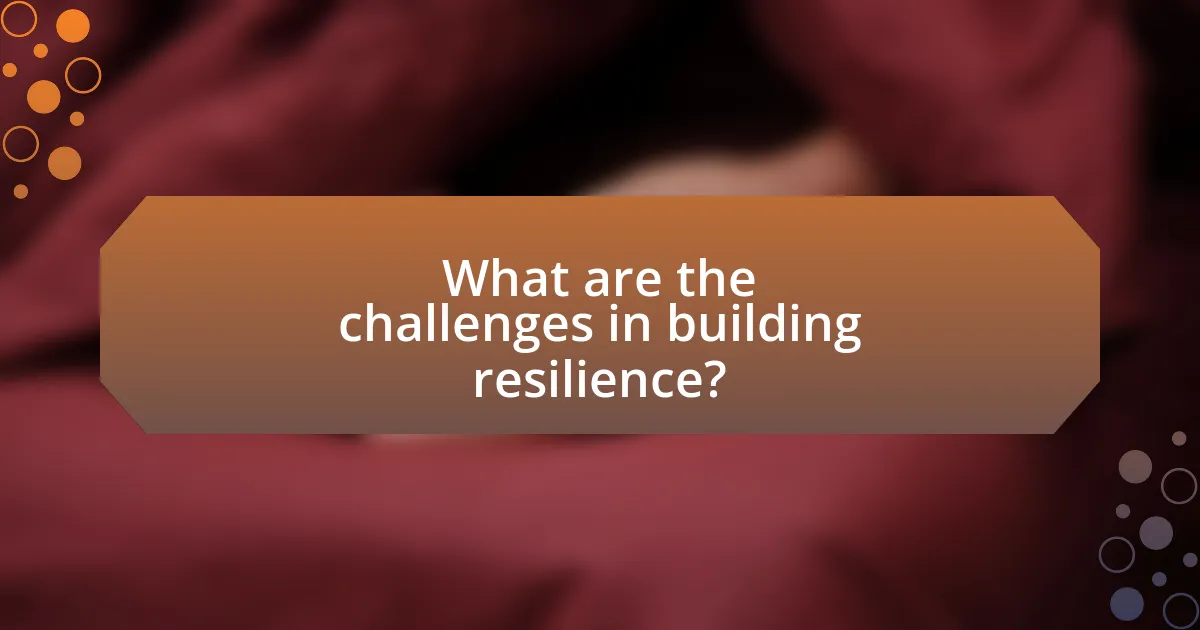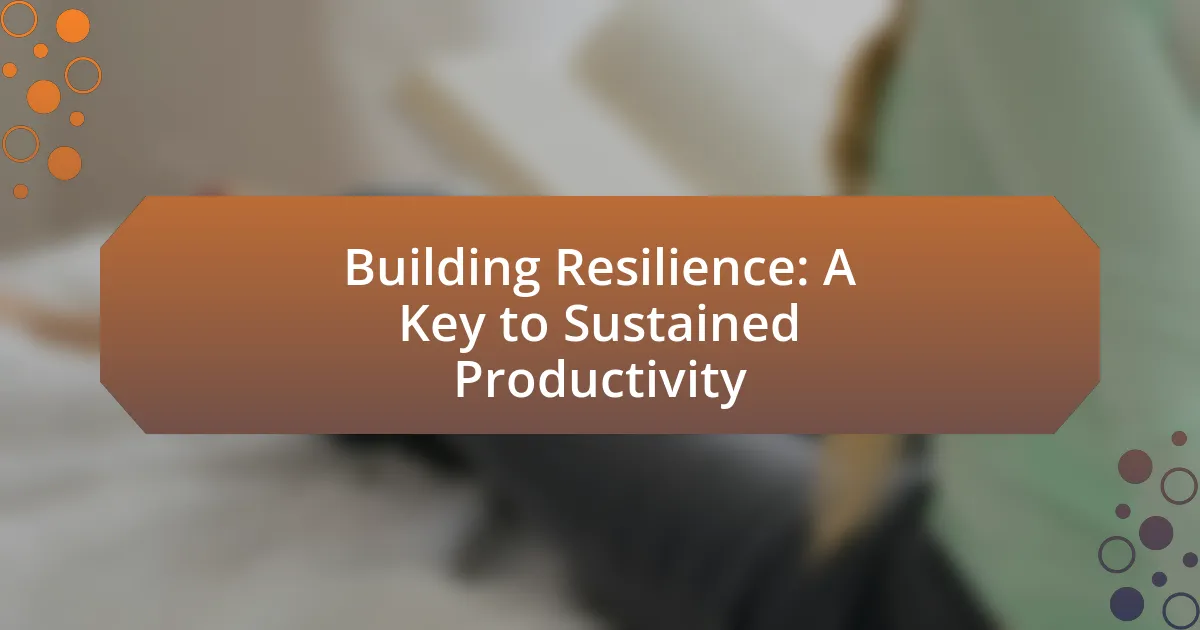Building resilience is essential for maintaining sustained productivity in both individuals and organizations. This article explores how resilience enables effective adaptation to challenges, enhances overall productivity, and fosters a positive workplace environment. Key characteristics of resilient individuals, such as adaptability and emotional regulation, are discussed, along with strategies for developing personal resilience and organizational practices that support resilience building. The article also highlights the long-term benefits of resilience, including improved employee well-being and reduced turnover rates, while addressing the challenges and obstacles that can impede resilience development.

What is Building Resilience in the Context of Productivity?
Building resilience in the context of productivity refers to the ability of individuals and organizations to adapt to challenges, recover from setbacks, and maintain high levels of performance despite adversity. This concept is crucial as research indicates that resilient teams are 30% more productive during times of stress compared to their less resilient counterparts. Resilience fosters a proactive mindset, enabling effective problem-solving and innovation, which are essential for sustained productivity in dynamic work environments.
How does resilience impact overall productivity?
Resilience significantly enhances overall productivity by enabling individuals to effectively cope with stress and adapt to challenges. When employees possess resilience, they are more likely to maintain focus and motivation during difficult situations, which leads to sustained performance levels. Research indicates that resilient individuals experience lower levels of burnout and higher job satisfaction, both of which contribute to increased productivity. For instance, a study published in the Journal of Occupational Health Psychology found that resilience is positively correlated with work engagement and negatively correlated with emotional exhaustion, demonstrating its critical role in maintaining productivity in the workplace.
What are the key characteristics of resilient individuals?
Resilient individuals exhibit key characteristics such as adaptability, emotional regulation, optimism, and strong problem-solving skills. Adaptability allows them to adjust to changing circumstances effectively, while emotional regulation helps them manage stress and maintain composure in challenging situations. Optimism enables resilient individuals to maintain a positive outlook, even in adversity, which is supported by research indicating that optimistic individuals are more likely to persevere through difficulties. Strong problem-solving skills empower them to identify solutions and navigate obstacles efficiently, contributing to their overall resilience.
How does resilience influence workplace dynamics?
Resilience significantly influences workplace dynamics by enhancing employee adaptability and collaboration. When employees exhibit resilience, they are better equipped to handle stress, navigate challenges, and maintain productivity during difficult times. Research indicates that resilient teams demonstrate higher levels of engagement and lower turnover rates, as they are more likely to support one another and foster a positive work environment. For example, a study published in the Journal of Occupational Health Psychology found that resilience training led to improved team cohesion and communication, ultimately resulting in better overall performance. This evidence underscores the critical role resilience plays in shaping effective workplace dynamics.
Why is building resilience essential for sustained productivity?
Building resilience is essential for sustained productivity because it enables individuals and organizations to effectively adapt to challenges and recover from setbacks. Resilient individuals maintain focus and motivation during difficult times, which directly correlates with consistent performance levels. Research indicates that resilience is linked to improved problem-solving skills and emotional regulation, both of which enhance productivity. For instance, a study published in the Journal of Occupational Health Psychology found that employees with higher resilience reported lower levels of burnout and higher job satisfaction, leading to increased productivity. Thus, building resilience fosters an environment where sustained productivity can thrive despite external pressures.
What are the long-term benefits of resilience in the workplace?
The long-term benefits of resilience in the workplace include improved employee well-being, enhanced productivity, and reduced turnover rates. Resilient employees are better equipped to handle stress and adapt to change, leading to higher job satisfaction and mental health. Research indicates that organizations with resilient workforces experience a 25% increase in productivity and a 30% decrease in absenteeism. Furthermore, resilient teams foster a positive work environment, which contributes to lower turnover rates, saving companies significant costs associated with hiring and training new staff.
How does resilience contribute to employee well-being?
Resilience significantly contributes to employee well-being by enabling individuals to effectively cope with stress and adversity in the workplace. Employees with high resilience are better equipped to manage challenges, leading to reduced burnout and increased job satisfaction. Research indicates that resilient employees experience lower levels of anxiety and depression, which directly correlates with improved mental health outcomes. For instance, a study published in the Journal of Occupational Health Psychology found that resilience training programs can enhance psychological well-being and job performance among employees. This evidence underscores the importance of fostering resilience as a means to promote overall employee well-being.

What strategies can be employed to build resilience?
To build resilience, individuals can employ strategies such as developing a strong support network, practicing mindfulness, and setting realistic goals. A strong support network provides emotional and practical assistance during challenging times, which has been shown to enhance coping mechanisms and reduce stress (Cohen & Wills, 1985). Practicing mindfulness helps individuals stay present and manage anxiety, leading to improved emotional regulation and resilience (Kabat-Zinn, 1990). Additionally, setting realistic goals allows individuals to focus on achievable outcomes, fostering a sense of accomplishment and motivation, which is crucial for maintaining resilience in the face of adversity.
How can individuals develop personal resilience?
Individuals can develop personal resilience by cultivating a growth mindset, practicing self-care, and building strong social connections. A growth mindset encourages individuals to view challenges as opportunities for learning and improvement, which enhances their ability to adapt to adversity. Research by Carol Dweck highlights that individuals with a growth mindset are more likely to persevere through difficulties. Additionally, engaging in regular self-care activities, such as exercise, mindfulness, and adequate sleep, has been shown to improve emotional regulation and stress management, as supported by studies from the American Psychological Association. Lastly, fostering strong social connections provides emotional support and resources during tough times, which is crucial for resilience, as indicated by findings from the Harvard Study of Adult Development, which emphasizes the importance of relationships in overall well-being.
What role does self-awareness play in building resilience?
Self-awareness is crucial in building resilience as it enables individuals to recognize their emotions, strengths, and weaknesses, which in turn facilitates better coping strategies during adversity. By understanding their emotional triggers and responses, individuals can manage stress more effectively and adapt to challenges. Research indicates that self-aware individuals are more likely to engage in proactive problem-solving and seek support when needed, enhancing their ability to bounce back from setbacks. For instance, a study published in the Journal of Occupational Health Psychology found that self-awareness is linked to improved emotional regulation, which is a key component of resilience.
How can stress management techniques enhance resilience?
Stress management techniques enhance resilience by equipping individuals with tools to effectively cope with challenges and adversity. These techniques, such as mindfulness, cognitive restructuring, and relaxation exercises, help reduce physiological and psychological stress responses, allowing individuals to maintain emotional stability during difficult times. Research indicates that practicing mindfulness can lead to a 30% reduction in perceived stress levels, which directly correlates with improved resilience. Furthermore, cognitive-behavioral strategies enable individuals to reframe negative thoughts, fostering a more adaptive response to stressors. This combination of reduced stress and improved cognitive flexibility strengthens an individual’s ability to bounce back from setbacks, ultimately contributing to sustained productivity.
What organizational practices support resilience building?
Organizational practices that support resilience building include fostering a culture of open communication, promoting employee well-being, and implementing adaptive leadership strategies. Open communication allows for the sharing of information and feedback, which enhances trust and collaboration among team members. Promoting employee well-being through mental health resources and work-life balance initiatives contributes to a supportive environment, enabling individuals to cope with stress effectively. Adaptive leadership strategies, which involve flexibility and responsiveness to change, empower organizations to navigate challenges and uncertainties. Research indicates that organizations with these practices are better equipped to withstand disruptions and maintain productivity, as evidenced by studies showing that companies prioritizing employee engagement and support experience higher resilience levels during crises.
How can leadership foster a resilient workplace culture?
Leadership can foster a resilient workplace culture by promoting open communication, encouraging adaptability, and supporting employee well-being. Open communication allows employees to voice concerns and share ideas, which builds trust and collaboration. Encouraging adaptability helps teams navigate challenges effectively, as evidenced by research from the Harvard Business Review, which found that organizations with flexible leadership styles are better equipped to handle change. Supporting employee well-being through initiatives such as mental health resources and work-life balance policies enhances overall morale and reduces burnout, contributing to a more resilient workforce.
What training programs are effective in enhancing resilience among employees?
Cognitive-behavioral training programs are effective in enhancing resilience among employees. These programs focus on developing coping strategies, emotional regulation, and problem-solving skills, which are essential for managing stress and adversity in the workplace. Research published in the Journal of Occupational Health Psychology indicates that employees who participated in cognitive-behavioral training reported significant improvements in resilience, job satisfaction, and overall mental health. Additionally, mindfulness-based stress reduction programs have also shown effectiveness in fostering resilience by promoting awareness and acceptance of present-moment experiences, thereby reducing anxiety and enhancing emotional stability.

What are the challenges in building resilience?
The challenges in building resilience include emotional regulation, social support, and adaptability to change. Emotional regulation is crucial as individuals often struggle to manage stress and negative emotions, which can hinder their ability to bounce back from adversity. Social support is another challenge; without a strong network, individuals may feel isolated and less capable of coping with difficulties. Additionally, adaptability to change is essential, as resistance to new situations can impede resilience. Research indicates that individuals who lack these skills may experience higher levels of anxiety and depression, further complicating their ability to develop resilience.
What obstacles do individuals face in developing resilience?
Individuals face several obstacles in developing resilience, including lack of support systems, negative thought patterns, and insufficient coping strategies. A lack of social support can hinder emotional recovery, as studies show that individuals with strong social networks are more resilient during stressful times. Negative thought patterns, such as catastrophizing or self-doubt, can impede one’s ability to adapt and recover from adversity, as cognitive distortions are linked to lower resilience levels. Additionally, insufficient coping strategies, such as ineffective stress management techniques, can prevent individuals from effectively navigating challenges, as research indicates that adaptive coping mechanisms are crucial for building resilience.
How can negative workplace environments hinder resilience?
Negative workplace environments hinder resilience by creating chronic stress and reducing employee morale. High levels of stress, often stemming from poor management practices, lack of support, or toxic relationships, can lead to burnout, which diminishes an individual’s ability to cope with challenges. Research indicates that environments characterized by negativity can result in a 50% increase in employee turnover and a 30% decrease in productivity, as reported by the Gallup Organization. This decline in productivity further exacerbates feelings of helplessness and disengagement, ultimately undermining resilience.
What personal factors can impede resilience building?
Personal factors that can impede resilience building include low self-esteem, negative thought patterns, and lack of social support. Low self-esteem can lead individuals to doubt their abilities, making it difficult to cope with challenges effectively. Negative thought patterns, such as catastrophizing or excessive self-criticism, can hinder problem-solving and adaptive responses to stress. Additionally, a lack of social support can leave individuals feeling isolated, reducing their capacity to seek help and share burdens, which is crucial for resilience. Research indicates that these factors significantly affect an individual’s ability to bounce back from adversity, as highlighted in studies on psychological resilience and coping strategies.
How can organizations overcome challenges to promote resilience?
Organizations can overcome challenges to promote resilience by implementing comprehensive training programs that enhance employee skills and adaptability. Research indicates that organizations that invest in continuous learning and development experience a 24% higher profit margin compared to those that do not. Additionally, fostering a supportive culture that encourages open communication and collaboration helps employees feel valued and engaged, which is crucial for resilience. A study by the American Psychological Association found that workplaces with strong social support systems report lower stress levels and higher employee satisfaction, further reinforcing the importance of a resilient organizational environment.
What strategies can be implemented to create a supportive environment?
To create a supportive environment, organizations can implement strategies such as fostering open communication, providing resources for mental health, and encouraging teamwork. Open communication allows individuals to express concerns and share ideas, which enhances trust and collaboration. Providing mental health resources, such as counseling services or stress management workshops, supports employees’ well-being and resilience. Encouraging teamwork through collaborative projects and team-building activities strengthens relationships and creates a sense of belonging. Research indicates that supportive environments lead to increased employee satisfaction and productivity, as seen in studies by Gallup, which found that engaged employees are 21% more productive.
How can feedback mechanisms aid in resilience development?
Feedback mechanisms enhance resilience development by providing individuals and organizations with timely information about their performance and areas for improvement. These mechanisms facilitate adaptive learning, allowing entities to adjust strategies based on real-time data and experiences. For instance, research by the American Psychological Association indicates that feedback fosters a growth mindset, which is crucial for resilience, as it encourages individuals to view challenges as opportunities for growth rather than setbacks. By integrating feedback into processes, entities can build a culture of continuous improvement, ultimately leading to sustained productivity and enhanced resilience in the face of adversity.
What practical tips can enhance resilience for sustained productivity?
To enhance resilience for sustained productivity, individuals should adopt a growth mindset, practice self-care, and establish strong social connections. A growth mindset encourages viewing challenges as opportunities for learning, which can lead to improved problem-solving skills and adaptability. Research by Dweck (2006) highlights that individuals with a growth mindset are more likely to persevere in the face of setbacks, thereby maintaining productivity.
Practicing self-care, including regular exercise, adequate sleep, and mindfulness techniques, has been shown to reduce stress and improve mental health, which directly correlates with increased productivity levels. A study published in the Journal of Occupational Health Psychology (Sonnentag & Fritz, 2007) found that employees who engage in self-care activities report higher levels of resilience and job performance.
Establishing strong social connections provides emotional support and resources during challenging times, which can buffer against stress and enhance resilience. Research indicates that social support is a critical factor in maintaining mental health and productivity, as noted in the American Journal of Community Psychology (Cohen & Wills, 1985). These practical tips collectively contribute to building resilience, thereby fostering sustained productivity.
How can daily routines be structured to build resilience?
Daily routines can be structured to build resilience by incorporating consistent practices that promote mental and physical well-being. Establishing a regular sleep schedule enhances cognitive function and emotional regulation, which are crucial for resilience. Engaging in daily physical activity, such as 30 minutes of exercise, has been shown to reduce stress and improve mood, thereby strengthening resilience. Additionally, incorporating mindfulness practices, like meditation or deep-breathing exercises, can help individuals manage stress effectively, as research indicates that mindfulness reduces anxiety and enhances emotional resilience. Lastly, setting aside time for social connections fosters support networks, which are essential for coping with challenges, as studies demonstrate that strong social ties correlate with increased resilience.
What role does community support play in fostering resilience?
Community support plays a crucial role in fostering resilience by providing individuals with emotional, social, and practical resources during challenging times. This support network enhances coping mechanisms, reduces feelings of isolation, and promotes a sense of belonging, which are essential for overcoming adversity. Research indicates that individuals with strong community ties are more likely to exhibit resilience, as they can draw on shared experiences and collective strength to navigate difficulties. For instance, a study published in the Journal of Community Psychology found that community engagement significantly correlates with improved mental health outcomes, highlighting the protective effects of social support in stressful situations.
